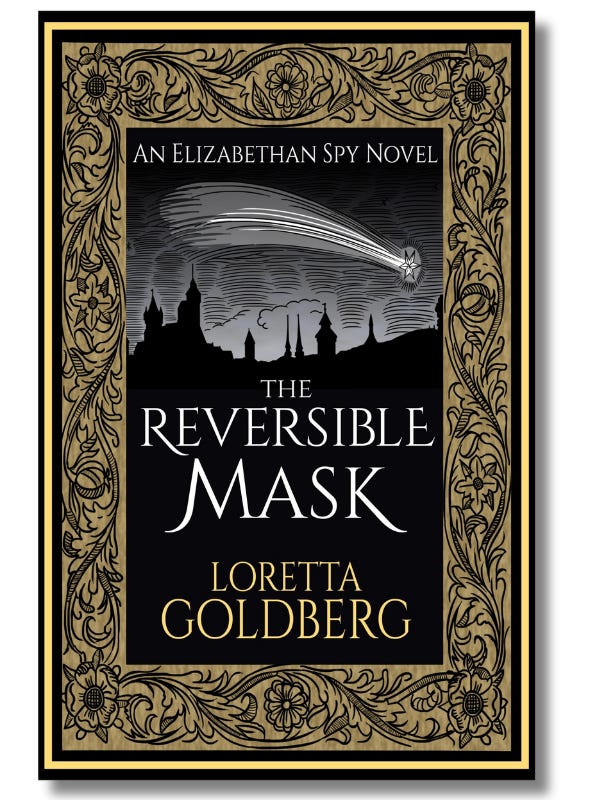An Elizabethan James Bond?
In The Reversible Mask, Loretta Goldberg creates a daring but honorable spy
I don’t read spy novels regularly. My enjoyment of the genre typically comes from film and TV: the James Bond franchise; the British series MI-5; Steven Spielberg’s Bridge of Spies, which is probably my favorite in this category. Mark Rylance won an Oscar for his riveting performance as the Soviet operative, Rudolf Abel. He even beat out Sylvester Stallone.
But I recently finished Loretta Goldberg’s The Reversible Mask, a historical novel about a sixteenth century double agent serving both Elizabeth I and Phillip II of Spain. It has twists, turns, codes, plots, disguises, sea battles, and more—it’s a grand, gripping, colorful adventure.

Since my own mind quickly goes to James Bond whenever I envision a “spy,” I was struck by the way author Goldberg enriches and deepens the beloved 007 standard. Yes, this novel is a smooth Elizabethan riff on a classic formula, but it ventures into far more profound and subtle territory.
If you love James Bond, you’ll find its most cherished qualities in The Reversible Mask.
An attractive, sophisticated hero
Bond is often described as “classy” with his custom-tailored tuxes and savoir faire in every setting. Goldberg’s hero is an elegant courtier named Edward Latham. He’s “handsome, energetic and cultured . . . [with] chiselled features [and] flaxen hair.” His eyes are “not the candid blue one expected in a blond.” Their shade changes “according to the color closest to his face.” Like Bond, he’s accomplished. He plays the lute, breaks coded messages, and speaks three languages.
A plot that rolls out in exotic locales
Bond’s escapades take him to Russia, Cairo, Tokyo, the Alps, and beyond. Latham, too, travels the known world. His odyssey begins in Elizabethan England, but he is soon operating in France, Spain, Antwerp, and Constantinople, each setting portrayed in rich, absorbing detail.
The best tech available
007 has a slew of clever gadgetry at his command: “exploding pens, submersible cars, and jetpacks at a time when they were not yet developed.” Latham uses ingenious sixteenth century innovations. Mirrors concealed in the brim of his hat let him know if he’s being followed. A colleague’s “looker” reveals an enemy’s location. He snoops on an inventor who designs ships that explode after they enter an opponent’s harbor. This new technology produces one of the novel’s most harrowing and ultimately moving episodes.
Liaisons and love affairs
How many Bond girls are there? And each one more breathtaking than the last. The handsome Edward Latham has affairs too, but his are less fleeting. His partners include men and women—a celebrated singer, an Ottoman official, a “comely” sailor with curly red hair. Even though he’s forced to move on, he often revisits these past loves in his recollections.
But The Reversible Mask is more than a well-crafted spy story. Its unexpected layers give it a satisfying psychological complexity. In the novel, Goldberg touches on:
Faith and morality
Bond is not cruel, but he is a moral cypher. Edward Latham is a devout Catholic who leaves England to practice his faith openly. Over time, he begins to spy for the Catholic cause. Yet he finds the Inquisition repugnant. Talk of assassinating the Protestant Queen Elizabeth unsettles him. An old friend from England intercedes, and Latham becomes a double-agent feeding information to the English crown. As Goldberg pointed out in one interview: “Being a spy requires some level of betrayal; becoming a double agent doubles it.”
Human connection
Bond is a loner with few long-term relationships. But Latham has both family and friends, and his loyalty to them adds tension and heartbreak to his story. After he departs England to serve the Catholic side, he worries about his sister left behind. Will she suffer if his spying is exposed? He treasures his decades-long bond with a Spanish military officer. Their camaraderie is one of the novel’s pleasures. But this man will be part of the Armada attacking England. Latham doesn’t want to endanger his friend, but he may have to make a choice.

The social and political climate of the era
The earlier Bond stories allude to the Cold War, but no one turns to them to gain a better understanding of the time. The Reversible Mask lays out the geopolitical maneuvering of sixteenth century Europe, England, and Scotland—and you won’t be bored for a single page. The novel paints a particularly memorable portrait of Elizabeth I. She is a distant figure for most of the story, but near the end we hear her thoughts. She has just condemned Mary, Queen of Scots—and ensured that she has “deniability.” Her “slinky statesmanship” is on display as she considers how to protect her realm in a violent, treacherous age.

I ask the author
I recently met Loretta Goldberg, so I wrote to her and asked about the novel’s origins. She cited a historical spy, Sir Anthony Standen, as one source for Latham. Sir Francis and Anthony Bacon reproduce this agent’s letters in their writings. As Goldberg puts it, Standen “had a compartmentalized life . . . complicated, on the edge . . . .”
But she also described a powerful contemporary example, one I aim to check out:
“To create Latham with his intractable conflicts, I was most inspired . . . by a one-of-a-kind Israeli documentary, The Green Prince. The gay son of a Hamas leader became a double agent for Israel Shin Bet. He was initially blackmailed by the Israelis, whom he hated for threatening to ‘out’ him, but [he] soon realized that the Hamas project ‘was a complete lie.’ He’d never like Israel but was convinced that the only potential future for Palestinians was to overcome Hamas. He drew red lines, his own moral ‘don’ts,’ that his Israeli handlers meticulously abided by . . . .
The film consists of alternating interviews or monologues by the Israeli handler and the Green Prince. That primary dialogue is what makes it unique. They tell their own story. Both were emotionally crippled by the relationship, the handler losing his job for being too ‘accommodating’ to his favorite spy. The Green Prince eventually had a breakdown and was retired, but lives safely in California.”

My own take
The Reversible Mask offers the vicarious excitement we expect of spy stories, coupled with the spectacle of its historical setting. You should read it for those reasons alone. But it soars because it delves into the conscience, soul, and heart of its hero. That’s what sets it apart.
Do you have a favorite literary spy? Why are we so captivated by secret agents?
MY OWN NOVEL, THE QUEEN’S MUSICIAN, IS NOW AVAILABLE WHERE BOOKS ARE SOLD.





